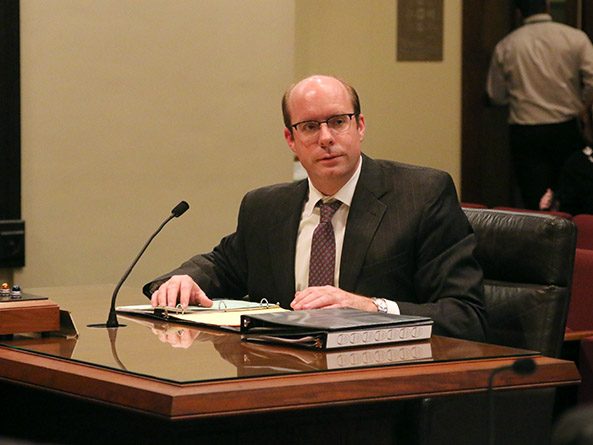Agency review of licensing rules proposed

State agencies would be required to determine whether an occupational licensing rule fulfills its intended purpose under a bill heard by the Government, Veterans and Military Affairs Committee Jan. 20.
LB36, introduced by Omaha Sen. Burke Harr, would require state agencies to review rules and regulations dealing with the issuance of occupational credentials on a regular basis.
Agencies would be required to complete documents that explain the purpose of each credentialing rule and the protection that each provides to Nebraska residents. The report also would make a determination that the rule or regulation has achieved its purpose without excessively impeding entrepreneurship and commerce. Finally, the assessment would include an estimate of the rule’s cost to state agencies, political subdivisions and the people it regulates.
The state Department of Health and Human Services would be the first state agency required to review its occupational licensing rules and regulations, beginning Jan. 1, 2018. The reviews then would be required every five years, beginning in 2023. The state Department of Labor would begin similar periodic reviews of its rules in 2019, followed by all other state agencies in 2020.
Harr said many state agencies already review their occupational licensing rules and regulations periodically, but they are not required to invite public input during that process.
LB36 would require agencies to conduct a public hearing on each rule’s assessment before submitting a final version to the Legislature’s Executive Board. If agencies fail to assess a rule, it would be nullified.
“I think we have to constantly review our rules and regs,” Harr said. “Is their purpose still valid? Is it still necessary?”
Jon Wilbeck, executive director of the Nebraska Board of Engineers and Architects, spoke in support of the bill. He said the board, which licenses 6,500 engineers and 1,500 architects around the state, plans to review its existing regulations early this year and hold a public hearing on proposed changes in April.
Wilbeck said requiring his agency to review its occupational licensing regulations every five years would be burdensome, but not overly so.
“The process outlined simply gives a more formal structure to what we essentially already do,” he said, “and that is to put in place sufficient, relevant, easy-to-understand and necessary regulations.”
No one testified in opposition to the bill and the committee took no immediate action on it.


